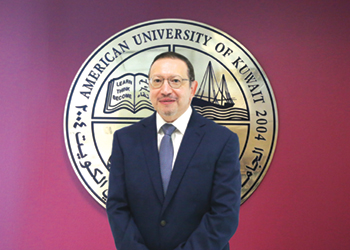
 Dr Zeid ... a strong proponent of the liberal arts education
Dr Zeid ... a strong proponent of the liberal arts education
The College's students are exposed to a variety of teaching methods and have conquered the global arena in major international innovative events such as NASA Space Apps Challenge, TEDxAUK, and Microsoft Imagine Cup Kuwait
The College of Engineering and Applied Sciences (CEAS) at the American University of Kuwait (AUK)—Kuwait’s first and only liberal arts university—is leading collaboration between industry and academia and pioneering research and innovation in ways that are unique to the Kuwaiti society and the region as a whole.
Established in September 2019, CEAS houses two academic departments: The Department of Computing, which offers degrees in Computer Science and Information Systems; and the Department of Engineering which offers degrees in Computer Engineering, Electrical Engineering, and Systems Engineering.
The College is headed by Dean Amir Zeid, a luminary who is a recipient of notable international awards and grants, the latest of which was the International Visitor Leadership Program (IVLP) by the US Department of State. An interdisciplinary researcher, Dr Zeid’s research interests include: global software engineering, cloud computing and STEM education. In 2014, Dr. Zeid established the Center for Research in Informatics, Sciences and Engineering (RISE) in 2014 which serves as AUK's primary source for multidisciplinary research and development (R&D) activities. The centre was later moved under CEAS where it cultivated an inspiring and innovative learning environment that complimented the College’s active learning curriculum.
WHY LIBERAL ARTS?
 |
CEAS fosters ingenuity and encourages cross-discipline collaboration |
"The approach turns a person from any discipline into a lifelong learner and develops well-rounded personalities who can play different roles when required, wear different hats when the situation calls for it," Dr Zeid tells Abdulaziz Khattak of OGN.
An example Dr Zeid cites that illustrates the dynamics of liberal arts is the field of artificial intelligence (AI). "AI is a combination of many things. Those in this field are moving to study psychology and law to understand how to deal with robots from a human perspective and a psychological point of view."
So, with this philosophy, CEAS aims to foster ingenuity and encourage cross-discipline collaboration to produce well-rounded and experienced graduates.
DYNAMIC LEARNING EXPERIENCE
AUK and especially CEAS strive to continuously improve its curricula. For course design, CEAS has what it calls the ‘industry advisory board’, which consists of experts from different domains that meet periodically with each department to discuss its curriculum and advise on market requirements.
These recommendations are studied by the departments and feedback is returned to the board by either adopting the recommendations in the courses or in some cases even creating entirely new courses.
This dynamic approach allows students to have the most up-to-date skills as required in the job market.
Dr Zeid stresses the need for advisory boards as a prerequisite for ABET accreditation. Currently, three of five CEAS programmes are ABET accredited, he proudly says.
Students from CEAS are exposed to a variety of teaching methods at AUK; they have conquered the global arena in major international innovative events such as NASA Space Apps Challenge, TEDxAUK, and Microsoft Imagine Cup Kuwait. Interacting and competing with the best students and industry professionals around the world, CEAS students are notorious for their stellar performances in these events. In November 2019, CEAS collaborated with Kuwait Oil Company (KOC) to organise a local Oil and Gas hackathon aiming at creating solutions for current challenges within the Oil and Gas sector. The event successfully brought together 76 participants, including oil and gas professionals who were teamed up with students from various universities in Kuwait.
"These events are a novel way of stimulating ideas, creating innovative solutions and helping contestants get industry mentors they would otherwise find difficult getting. They are also good ways of teaming together people from different disciplines thus emphasising the multidisciplinary approach," Dr Zeid says.
Hackathons also offer a platform for contestants to showcase their talents to industry experts, which opens doors for job opportunities.
Another mandate of the College is organising outreach events. These include scientific and multidisciplinary lectures which are open to the public and are attended by people from all walks of life.
"This year we had a speaker from the US to talk about cybersecurity which is a very hot topic. This again diversifies the source of mentorship and exposure to different disciplines in a way," says Dr. Zeid.
CEAS LEARNING CULTURE
Dr Zeid has been fostering a culture of innovation and inclusivity ever since he joined AUK in 2007, and has continued to apply this approach in CEAS’s daily operations.
He has successfully practiced this approach when he formed the first group of students at AUK 10 years ago to compete in a computer competition. In the years that followed, the number of groups increased exponentially with teams winning regional competitions and even encouraging females to joining in with their brilliant ideas.
He recalls a female student, who came up with an idea about a device to help physically challenged people. He mentored the group and led them at local and regional competitions, winning at both levels.
Dr Zeid is a strong advocate of females in engineering and computer science. Years back, he mentored an all-female Kuwaiti team on an international competition by Microsoft in Poland. The team was highlighted in international media and was one of only three all-female teams from among 68 global teams in that contest.
He says the classroom percentage of women taking up engineering and computer science studies in Kuwait is between 40-50 per cent. That’s much more than the percentages in the US and Europe.
CEAS also integrates competitions in the very courses taught so as to align activities in both theory and practice, thus optimising learning outcomes and enabling students to become more innovative and independent.
"It is important to mention that Kuwait 2035 vision places primary emphasis on education as a pivotal tool to build a generation equipped with the soft skills required to build a diverse economy. In line with this, CEAS aims to produce young IT professionals who possess not only high engineering skills, but also innovative minds capable of fulfilling Kuwait's vision for the future," Dr Zeid concludes.





































































